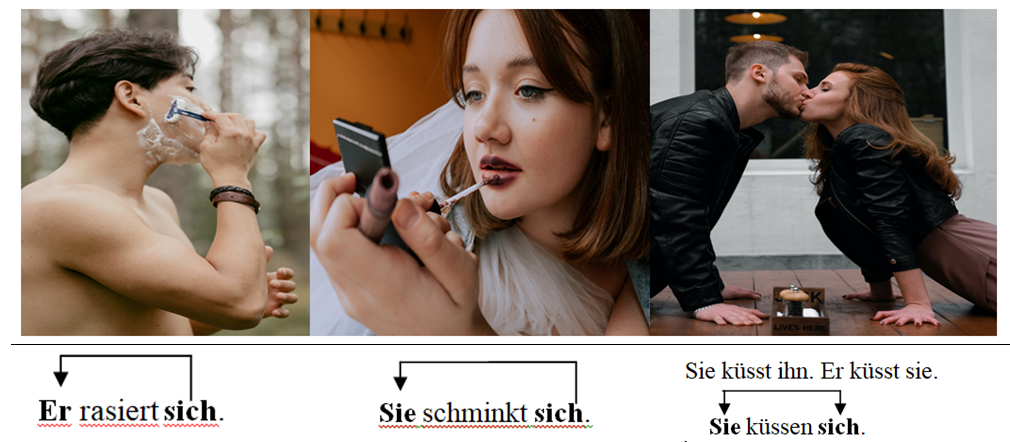In this lesson, you will learn everything you need to know about the reflexive verbs in German. How are they formed, which are reflexive verbs, and what does the reflexive pronoun look like in German, and some other important things.
Thank you for reading this post, don't forget to subscribe!CONTENTS
Reflexive pronouns
Accusative reflexive pronouns (mich, dich)
Verbs with or without sich
Dative reflexive pronouns (mir, dir)
English equivalents for German reflexive verbs
Word order
Study tip
Reflexive pronouns
The reflexive pronoun indicates that a process or a feeling refers back to the sentence’s subject. The subject always represents the same person or thing as the subject, for example, ‘You’ and ‘yourself’ refer to the same individual. Reflexive pronouns are used more frequently in German than in English. In German, there are two forms of reflexive pronouns: accusative and dative.
| Personal Pronouns | Reflexive Pronouns | English | |
| Accusative | Dative | ||
| ich | mich | mir | myself |
| du | dich | dir | yourself ( informal sing.) |
| er/sie/es/ man | sich | sich | himself/ herself/itself/oneself |
| wir | uns | uns | ourselves |
| ihr | euch | euch | yourselves ( informal plural.) |
| sie | sich | sich | themselves |
| Sie | sich | sich | yourself/yourselves (formal) |
For example:
Ich wasche mich. (I wash myself./ I’m washing myself.)
Ich wasche mir die Hände. (I wash my hands. / I’m washing my hands.).
Mia fühlt sich gar nicht gut. (Mia doesn’t feel well at all./ Mia isn’t feeling well at all.)
Wir treffen uns um 5 Uhr. (We meet at 5 o’clock.)
Hast du dir das auch gut überlegt? (Have you thought this through carefully?)

Click on:
Grammar Contents
Accusative reflexive pronouns (mich, dich)
A large number of verbs are used with a reflexive pronoun in the ACCUSATIVE case.
Certain verbs, such as sich freuen, are always used only with a reflexive pronoun. These reflexive verbs have no direct equivalent in English, and the REFLEXIVE PRONOUN is an integral part of the verb.
| sich ausruhen ( to rest) | Ich ruhe mich jetzt aus.( I’m going to rest now.) |
| sich bedanken (für) (say ‘thank you’ (for)) | Er bedankte sich für ihre Hilfe. (He thanked them for their help. |
| sich beeilen ( to hurry) | Du beeilst dich. ( You hurry.) |
| sich befinden (be located) | Dort befindet sich ein Café. (There is a café there.) |
| sich benehmen (behave) | Sie benimmt sich wie ein Kind.( She behaves like a child.) |
| sich beschweren (über) (complain (about)) | Er beschweren sich über den schlechten Service. (He complains about the poor service.) |
| sich eignen (für) (be suited (to)) | Sie eignet sich gut für diesen Beruf.(She is well suited to this job.) |
| sich erholen (recover) | Wir haben uns im Urlaub sehr gut erholt. (We had a very good rest on holiday.) |
| sich erkälten (catch a cold) | Hast du dich erkältet oder ist das eine Allergie? (Do you have a cold or is it an allergy?) |
| sich entschließen (zu) (decide (to)) | Ich entschloss mich zum Kauf dieses Wagens. (I decided to buy this car.) |
| sich freuen ( be happy) | Wir freuen uns auf die Ferien. (We look forward to the holidays.) |
| sich irren (be mistaken) | Ich habe mich geirrt. (I was mistaken.) |
| sich verabreden (make an appointment) | Für heute Abend habe ich mich schon verabredet.( I’ve already made an appointment for tonight.) |
| sich verlieben (fall in love) | Sie hat sich verliebt. (She’s fallen in love.) |
| sich weigern (refuse) | Er weigert sich zu gehorchen. (He refuses to obey.) |
| sich wundern (wonder) | Ich wundere mich, dass alles so gut klappte. (I’m amazed that everything went so well.) |
Verbs with or without sich
Some verbs can be used transitively with an accusative object or reflexively.
When used transitively, they correspond to the English transitive verb.
When used reflexively, they correspond to the English intransitive verb or the English passive construction:

sich Acc. waschen – Ich wasche mich. (I wash myself.)
sich Dat. waschen + Acc.* –Ich wasche mir die Hände. ( I wash my hands.)
waschen + Acc. – Ich wasche mein Kind. ( I wash my child.)
* If there is an accusative object, the reflexive pronoun is in the dative case.
also like this:
| sich ändern (change) | Sie hat sich wirklich geändert. (She really has changed.) |
| jdn./etw. ändern (change sb./sth.) | Sie ändert oft ihre Pläne.(She often changes her plans.) |
| sich anmelden (enroll) | Ich habe mich für einen Kochkurs angemeldet. (I enrolled in a cooking class.) |
| jdn. anmelden (enroll sb.) | Ich habe meinen Sohn für den Kurs angemeldet.( I enrolled my son for the course.) |
| sich anziehen (dress/ put on) | Sie zieht sich warm an. (She dresses warmly.) |
| jdn. anziehen (dress sb. / put on) | Die Mutter zieht dem Kind eine Jacke an. (The mother puts a jacket on the child.) |
| sich ärgern (be annoyed) | Er ärgert sich ständig. (He is constantly annoyed.) |
| jdn. ärgern (annoy sb.) | Er ärgert seine Schwester. (He annoys his sister.) |
| sich aufregen (upset) | Du regst mich wirklich auf! (You’re really upsetting me!) |
| jdn. aufregen (upset sb.) | Diese Unordnung regt ihn auf. (This disorder upsets him.) |
| sich fürchten (be afraid) | Sie fürchtet sich vor Spinnen. (She is afraid of spiders.) |
| jdn. Fürchten (fears sth.) | Er fürchtet eine Katastrophe. (He fears a catastrophe.) |
| sich langweilen (be bored) | Ich langweile mich.( I’m bored.) |
| jdn. langweilen (bore sb.) | Er langweilt sie. (He bores her.) |
| sich öffnen (open) | Er öffnete sich dem Neuen.( He opened himself up to the new.) |
| etw. öffnen (open sth.) | Sie öffnet ihren Schirm. (She opens her umbrella.) |
| sich treffen (meet) | Ich treffe mich morgen mit Freunden. (I’m meeting friends tomorow.) |
| jdn. treffen (meet sb.) | Ich treffe morgen einen alten Freund. (I’m meeting an old friend tomorow.) |
| sich verletzen (injure/ hurt) | Er hat sich beim Sport verletzt. (He injured himself doing sports.) |
| jdn. verletzen (injure/ hurt sb.) | Er verletzte mich an der Hand. (He hurt my hand.) |
| sich verteidigen (defend) | Ich muss mich verteigen. (I have to defend myself.) |
| jdn./etw. verteidigen (defend sb./sth.) | Sie verteidigte den Angeklagten. (She defended the accused.) |
Other verbs have a different meaning depending on whether they are used transitively, with an accusative object, or reflexively, with a reflexive pronoun:
| sich beherschen (control oneself) | Du musst dich beherschen. (You have to control yourself.) |
| etw. beherschen (master sth.) | Er beherrscht die deutsche Sprache.(He is fluent in German.) |
| sich beschäftigen (occupy oneself) | Er beschäftigt sich gern mit seinen Blumen.( He likes to occupy himself with his flowers.) |
| jdn. beschäftigen (employ) | Unsere Firma beschäftigt 50 Angestellte. (Our company employs 50 people.) |
| sich erinnern (remember) | Sie erinnert sich oft an ihre Kindheit. (She often remembers her childhood.) |
| jdn. erinnern (remind sb.) | Sie erinnerte mich an unsere Besprechung. (She reminded me of our meeting.) |
| sich fragen (wonder, ask oneself) | Er fragte sich, ob er Recht hat. (He wondered if he was right.) |
| jdn. fragen (ask sb.) | Der Fahrer fragt ihn nach dem Weg. (The driver asks him for directions.) |
| sich hinlegen (lie down) | Ich lege mich hin. (I am going to lie down.) |
| etw. hinlegen (lay/put down sth.) | Wo soll ich das Buch hinlegen? (Where shall I put the book?) |
| sich setzen (sit down) | Er setzte sich auf den Sessel. (He sat down on the armchair.) |
| jdn./etw. setzen (put sb./sth.) | Er setzt seine Brille auf den Tisch. (He puts his glasses on the table.) |
| sich unterhalten (have a chat) | Er unterhält sich mit seinen Gäste. (He chats with his guests.) |
| jdn. unterhalten (entertain sb.) | Er unterhält seine Gäste. (He entertains his guests.) |
Dative reflexive pronouns (mir, dir)
| accusative reflexive verb | dative reflexive verb | accusative object | ||
| ich | freue mich | ich | wasche mir | die Hände. |
| du | freust dich | du | wäschst dir | |
| er,sie,es | freut sich | er,sie,es | wäscht sich | |
| wir | freuen uns | wir | waschen uns | |
| ihr | freut euch | ihr | wascht euch | |
| sie/Sie | freuen sich | sie/Sie | waschen sich | |
If you take a closer look at the table above, you’ll see that only the pronouns “mich” and “dich” change, while “sich,” “uns,” and “euch” stay the same.
So, we just need to be mindful of when to use “mir” and “dir,” or more specifically, “mich” and “dich.” You’ll soon find out how to use these pronouns. The reflexive pronouns “dir” and “mir” can be used when the action refers back to the subject.
A reflexive dative pronoun is often used in German to indicate that a part of the body or article of clothing belongs to the subject of the clause. In this kind of construction German rarely uses a POSSESSIVE DETERMINER, unlike English:
For example:
Ich wasche mir die Hände. – I wash my hands.
Ich putze mir die Zähne. -I brush my teeth.
Warum wäschst du dir so often die Haare? –Why do you wash your hair so often?
Ich habe mir die Finger verbrannt.- I burnt my fingers.
Wann hast du dir das Bein gebrochen? When did you break your leg?
Additionally, these pronouns indicate that you are doing something to or for yourself.
Wir kaufen uns ein neues Haus.- We are buying ourselves a new house.
Nimm dir doch noch etwas Kuchen. –Have some more cake.
Kauf dir etwas Schönes! – Buy yourself something nice.
Ich hole mir ein Glas Milch. – I get myself a glass of milk.
Hol dir Billigtickets! – Get yourself cheap tickets!
Nehmen Sie sich noch eine Tasse Kaffee. – Have another cup of coffee.
A very few verbs always have a dative reflexive pronoun, as well as an accusative object, like: sich etwas einbilden, sich etwas vorstellen, sich etwas vornehmen:
• sich etwas einbilden (imagine sth.)
Das hast du dir nur eingebildet. (unreal) You only imagined that.
• sich etwas vorstellen (imagine, visualize)
Ich kann mir das sehr gut vorstellen. I can imagine that very well/visualize that very clearly.
• sich etwas vornehmen (resolve)
Wir nehmen es uns fest vor. We are firmly resolved to do that.
With reflexive verbs that also have an accusative object, the reflexive pronoun is in the dative case.
For example:
sich etw. ansehen watch – Hast du dir den Film schon angesehen.
sich etw. ausdenken – Ich denke mir etwas aus.
sich etw. merken memorize – Hast du dir ihren Vornamen gemerkt.
sich etw. rasieren shave – Ich rasiere mir die Beine jede Woche.
sich etw vorstellen imagin – Du stellst dir die Sache zu einfach vor.
sich etw waschen wash – Wasch dir die Hände!
English equivalents for German reflexive verbs
In German, certain verbs always require a reflexive pronoun. While some of these verbs correspond to similar verbs in English, reflexive verbs are more common in German. However, there are many verbs that need a reflexive pronoun in German where you wouldn’t expect one in English. Let’s explore some of these verbs.
To get
The phrase ‘to get’ combined with a past participle is expressed in German using a reflexive verb.
For example:
sich (A) ärgern (to get annoyed)
sich (A) anziehen (to get dressed )
sich (A) betrinken (to get drunk)
sich (A) aufregen (to get excited )
sich (A) verirren / sich verlaufen (to get lost )
sich (A) vorbereiten (to get ready )
sich (A) ausziehen (to get undressed )
sich (A) gewöhnen (an) (to get used/accustomed (to) )
To be
The phrase ‘to be’ combined with a past participle or an adjective often signifies a state of mind. Common examples include:
sich (A) schämen (to be ashamed )
sich (A) fürchten (vor) (to be frightened (of) )
sich (A) interessieren (für) (to be interested (in) )
sich (A) freuen (über) (to be pleased (at) )
sich (A) wundern (to be surprised )
Mental state and feelings
Some verbs are more challenging to categorize; some refer to mental states or feelings-related actions.
For example:
sich(A) entschuldigen (to apologize)
sich (A) nähern (to approach)
sich (A) befinden (to be, to be located)
sich (A) erkälten(to catch a cold)
sich (A) beklagen(to complain)
sich (A) fühlen (to feel)
sich (A) beeilen (to hurry)
sich (D) einbilden(to imagine)
sich (D) vorstellen (to imagine/envision)
sich (A) sehnen (nach) (to long (for))
sich (A) freuen (auf) (to look forward (to))
sich (A) erinnern (an) (to remember)
sich(A) bedanken (to say thank you, to express one’s thanks)
Word order
| 2. PLACE | ||
| Meine Schwester | kümmert | sich heute mal um meine Kinder. |
| Heute | kümmert | sich meine Schwester mal um meine Kinder. |
| Heute | kümmert | sie sich mal um meine Kinder. |
In German, an important rule is that the verb must appear in the second position of a sentence. The reflexive pronoun sich comes directly after the verb or close to it.
Study tip
As in other languages, there is no rule in German about whether verbs are reflexive. These verbs are best learned with the reflexive pronoun or memorizing a whole sentence with an example in the first or second person.
For example:
Ich freue mich auf deinen Besuch.
Ich kann mir Namen schlecht merken.
See more:
Bis zum nächsten Mal! 😊



